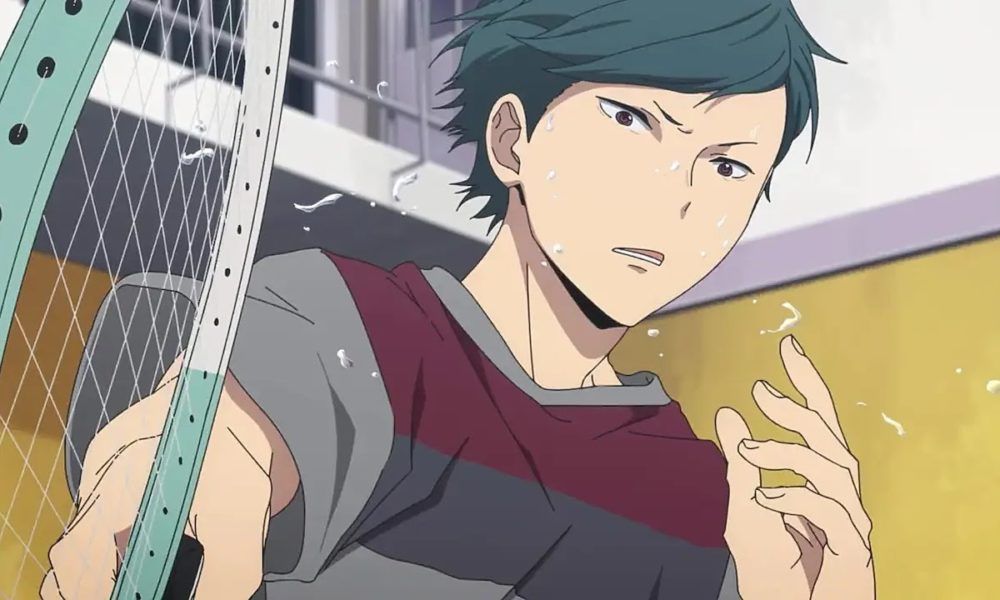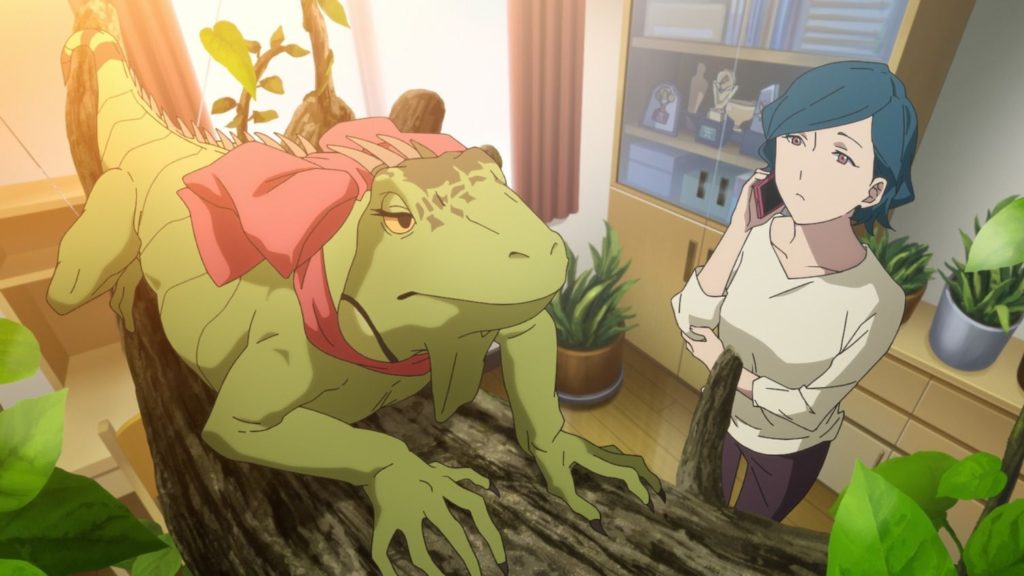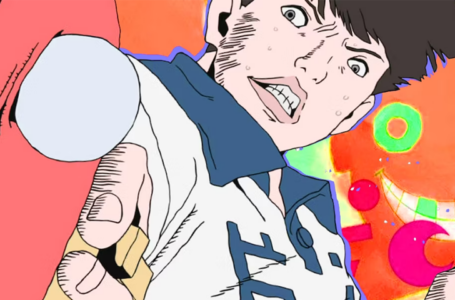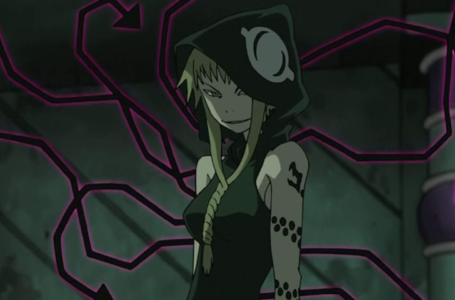Salaryman’s Club is our new feelgood sports anime obsession
There are too many streaming services today. It turns out that money really doesn’t grow on trees as an adult (Preach – Ed.) and thus I’ve had to make some tough decisions with my anime watching. By sticking to nothing more than a Crunchyroll subscription, I missed out on one of last year’s great sports anime, SK8 The Infinity. But hopefully that won’t be for forever, and in the meantime, Salaryman’s Club is a great sports anime that can be found on Crunchyroll, and which has blown me away with its quality.
Take a look at that plot
Salaryman’s Club is animated by Liden Films, and is an anime original. It’s Ami Yamauchi’s debut as the director of an entire show, though they’ve previously directed one-off episodes in other series such as Tokyo Revengers. It also has Suzuhito Yasuda as its original character designer; their past work in series that originated as light novels such as Durarara!! and Is It Wrong to Try to Pick Up Girls in a Dungeon? is their most well-known.
The show started airing in January of 2022 and closed out its 12 episodes in April. The story follows Mikoto Shiratori, a prodigy badminton player whose unnatural talent of having incredible foresight makes him the badminton version of Kuroko’s Basketball’s Akashi. He’s insanely perceptive, but a traumatic experience left him unable to explore his talents to their fullest; an accidental play injured his partner during an inter-high school competition.
After graduating, he stops taking the sport so seriously, and lands a job in Mitsuhoshi Bank that allows him to be a part of one of the best badminton work teams around. But he is laid off quite soon after joining since his lack of enthusiasm on the badminton court means his performance is also lacking — and in Japanese workplace culture, that can see you out of not just the team, but your whole job, too.
Feeling down about his future, he’s presented with a job offer at Sunlight Beverage shortly after. He learns a number of the company’s sales team are on their badminton team, with one of the most noteworthy being Tatsuru Miyazumi, his polar opposite. Tatsuru reignites Mikoto’s passion for the sport as, together, they work to build the team up into being a truly competitive threat.
A mature cast, story and themes

It’s been a while since a sports anime has resonated with me as much as Kuroko’s Basketball did with my teenage self, but here we are: I can officially say I’m obsessed with Salaryman’s Club, and a big part of that is how it focuses on adulthood. It’s refreshing and relatable for folks around the same age as me, or older.
Its story balances an exploration of Japanese corporate lifestyle with characters’ lifelong passions, and this truly adds stakes to the story — since if their efforts on the court aren’t enough, then their income will be in jeopardy. Additional tension is added through characters’ states of health, and the fragility of their potential as they age means that their long-term skill is constantly in question.
But despite this, Salaryman’s Club remains a hopeful, positive show, with its cast supporting and inspiring one another. Its main character is learning to overcome trauma, after all, and the rest of the supporting characters each have their own circumstances they need to learn to tackle in order to thrive.
Episodes are usually half office work, half badminton, with a few episodes occasionally being focused fully on one or the other. Thanks to such a structure, we get a chance to see each character in the main team getting moments of depth and growth that affect both their day to day work and their performance on the badminton court. We learn about their career aspirations, how they face and defeat their inner saboteurs — and how some of them even pick up a past hobby after their work, family and adult responsibilities had previously taken up all of their time and energy.
Salaryman’s Club is a simple badminton anime that shows off how endearing normalcy and everyday conflicts are; it’s an absolute joy to witness with each and every episode. It’s especially memorable for its characters, who each have unique quirks that make the main grouping of the Sunlight Beverage team diverse in their temperaments, and personal conflicts that keep each one engaging yet still relatable. Right now, I can’t say the same about the other currently airing sports anime Love All Play, which also happens to be about badminton. What are the chances of that?
Endearing characters, a supportive and comforting environment

So, about its lovely characters: let’s start from the top!
Tatsuru and Mikoto bond both on and off the court during their employment. They learn one another’s weaknesses, build each other up and grow their athletic potential by supporting and playing to one another’s strengths. They complement one another in both fields, and this makes both the “sporting” and “business” aspects of Salaryman’s Club appealing and emotionally engaging. Tatsuru’s enthusiastic and initially one-sided attempts to appeal to Mikoto ultimately rub off on him, and the show closes out with Mikoto turning over a new leaf in terms of attitude.
The dynamics elsewhere in the core Sunlight Beverage group have plenty of varying personality clashes and matches, too; the office is always lively and evolving, and never fails to be humorous and entertaining.
The two brothers Sota Saeki and Toya Saeki couldn’t be any less similar, for example, nor could they be any further differentiated in their lives’ concerns and their attitude towards badminton.
Sota is a gamer — made obvious through how he talks using gamer slang. He’s great at what he does, but he doesn’t make any attempts to push his limits. He’s lax and laid-back by nature — in itself, this limits his growth in and his passion for badminton. Toya, by comparison, wants to support the team for the greater good by taking into account issues that affect other people as well as himself. Toya always means well in a more obvious way than Sota does, and the pair frequently fail to see one another’s intentions as a result of their differing natures.
Then there’s Koki Takeda, the oldest member other than Tetsuru. He’s a happy-go-lucky guy struggling with stage fright after experiencing a bad event in his childhood that haunts him to this very day. His development is easily one of the best in the show, where his acknowledgement of his limitations in badminton ends up opening another door to his future.
His story isn’t a downer; instead, it provides an alternative outlook that highlights how understanding your own limits with your head held high can lead to you maximising your potential in other areas. It’s refreshing and inspiring to see.
Feel-good everything

Despite the harsh consequences for failure we see Mikoto suffer early in Salaryman’s Club, the show repeatedly presents its characters as trying their very best, and still failing at times — but that’s what life is all about, after all. The show does the complete opposite to Kuroko’s Basketball in that it lacks the unrealistic, superhuman skills seen in that series, instead representing the sport as realistically as possible, and the overall tone mixes the mundane with a sense of positivity. It’s a harmonious match that makes it all the more appealing, grounded and relatable.
Also on the relatable side of things is how the show depicts the balance of work commitments with sporting aspirations. We see the employees of Sunlight Beverage sometimes being swept off their feet by manic situations, or enjoying quiet mundanity during more peaceful times. There’s never a dull moment, and each of the characters get their own distinct turning points as a result of the things that happen. The series showcases the dynamics of an office in a realistic way, and the hardships that a beverage company might find themselves facing; it’s entertaining and informative, even during its more subtle moments.
Whether you’re more invested in the sporting aspect or the workplace events, both parts of Salaryman’s Club share the same takeaway: that you should never give up on your life’s passions and dreams, and that age really doesn’t matter. This is perhaps best exemplified through the supporting character Toru Usuyama, who feels quiet enthusiasm and a certain amount of jealousy towards his co-workers as he sees them enjoying a sport he was once so promising in.
His wife Futami notices this, and acknowledges and appreciates the years he has spent focusing on providing money for her and their son as his primary concern in life; he sidelined his passion to be a good husband and father, so now she wants him to aim for his own desires. It’s a gloriously sweet and emotional moment of the ilk we don’t often see in anime, and his significance to this moral message is furthered during the series’ final showdown during the S/J League, the biggest corporate tournament in badminton. It provides an emotional send-off for his character, for sure.
Then there’s best boy Tatsuru Miyazumi, the show’s oldest gentleman in the team. Tatsuru is a massive dork, throwing himself, his thoughts, and whole being into whatever he feels passionate about – often alongside Mikoto, because we can never have enough fujoshi-bait, can we?
He’s got a good head on his shoulders, being vocally supportive and extremely thoughtful with his colleagues and others, but the best thing about him is his age. He’s 32 years old, and never drops his enthusiasm or drive for continuing to participate in the things he loves doing. He’s the very definition of a comfort character, the eventual conflict the show ends up highlighting only makes his list of admirable qualities all the more formidable — and it makes me mad on the daily that he’s trapped in the 2D world.
Salaryman’s Club, whilst being just as cliché-filled as any other slice-of-life anime, remains heart-warming thanks to all these characters and the stories they have to tell. Sometimes even the show’s “opponents” give a helping hand to the main cast, even if it’s simply by giving the smallest piece of advice about their daily lives, or as fellow athletes on the court. There’s an endearing, chaotic energy in these groups of tight-knit buddies who initially appear to be quite incompatible, but ultimately come to function as a small family unit of sorts.
The show’s pretty bad boy and major antagonist Takuma Kirishima also had me feeling nostalgic for the troublesome Hanamiya Makoto from Kuroko’s Basketball; he was one of the best characters in the series for increasing tension and conflict. Takuma falls short in comparison, though, failing to leave a big enough impression, even if the show attempts to make him somewhat sympathetic with a backstory. We do at least see him becoming a better person and a team player in the show’s closing montage — or, at least, he’s trying, anyway.
The best villain by far, though, is the anti-fun, uptight, corporate cog Hajime Masatoki. He’s the manager of Mitsuhoshi Bank’s badminton club, and he’s out to undermine Mikoto’s perseverance after having fired him from the team in the opening of the anime. Mikoto’s vow to beat his team provides plenty of dramatic tension as we wait to see his smug face wiped clean — and he’s not the smartest antagonist, either, making for plenty of comedic moments as well as a sense that the more likeable characters will eventually prevail.
So should you watch Salaryman’s Club? I think you know the answer by now: you really, really should give it a show. Its animation is on point, its music complements the entire package well, and it’s a great way to spend some time with loveable characters, relatable messages and an overall sense of positivity.
There are hints that we might see a season 2 covering a story arc about the national championships, but we’ll have to wait and see what happens there — in the meantime, if you’re yet to watch the first season for yourself, catch it now on Crunchyroll.
Join The Discussion
Rice Digital Discord
Rice Digital Twitter
Rice Digital Facebook
Or write us a letter for the Rice Digital Friday Letters Page by clicking here!
Disclosure: Some links in this article may be affiliate links, which means we may earn a small commission if you make a purchase after clicking on them. This is at no additional cost to you and helps support Rice Digital!
- Sigh of the Abyss: Shadow Bonds – Prologue Review - October 7, 2023
- Is She The Wolf? is wickedly addicting TV - October 6, 2023
- The steady consumption of Slow Damage - October 5, 2023






